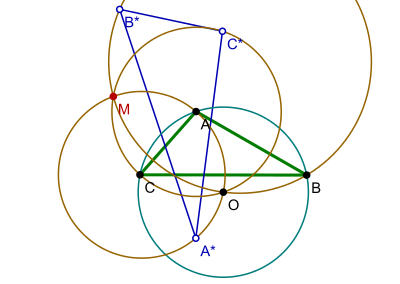Musselman's theorem
In Euclidean geometry, Musselman's theorem is a property of certain circles defined by an arbitrary triangle.

Specifically, let  be a triangle, and
be a triangle, and  ,
,  , and
, and  its vertices. Let
its vertices. Let  ,
,  , and
, and  be the vertices of the reflection triangle
be the vertices of the reflection triangle  , obtained by mirroring each vertex of
, obtained by mirroring each vertex of  across the opposite side.[1] Let
across the opposite side.[1] Let  be the circumcenter of
be the circumcenter of  . Consider the three circles
. Consider the three circles  ,
,  , and
, and  defined by the points
defined by the points  ,
,  , and
, and  , respectively. The theorem says that these three Musselman circles meet in a point
, respectively. The theorem says that these three Musselman circles meet in a point  , that is the inverse with respect to the circumcenter of
, that is the inverse with respect to the circumcenter of  of the isogonal conjugate or the nine-point center of
of the isogonal conjugate or the nine-point center of  .[2]
.[2]
The common point  is the Gilbert point of
is the Gilbert point of  , which is point
, which is point  in Clark Kimberling's list of triangle centers.[2][3]
in Clark Kimberling's list of triangle centers.[2][3]
History
The theorem was proposed as an advanced problem by J. R. Musselman and R. Goormaghtigh in 1939,[4] and a proof was presented by them in 1941.[5] A generalization of this result was stated and proved by Goormaghtigh.[6]
Goormaghtigh’s generalization
The generalization of Musselman's theorem by Goormaghtigh does not mention the circles explicitly.
As before, let  ,
,  , and
, and  be the vertices of a triangle
be the vertices of a triangle  , and
, and  its circumcenter. Let
its circumcenter. Let  be the orthocenter of
be the orthocenter of  , that is, the intersection of its three altitude lines. Let
, that is, the intersection of its three altitude lines. Let  ,
,  , and
, and  be three points on the segments
be three points on the segments  ,
,  , and
, and  , such that
, such that  . Consider the three lines
. Consider the three lines  ,
,  , and
, and  , perpendicular to
, perpendicular to  ,
,  , and
, and  though the points
though the points  ,
,  , and
, and  , respectively. Let
, respectively. Let  ,
,  , and
, and  be the intersections of these perpendicular with the lines
be the intersections of these perpendicular with the lines  ,
,  , and
, and  , respectively.
, respectively.
It had been observed by J. Neuberg, in 1884, that the three points  ,
,  , and
, and  lie on a common line
lie on a common line  .[7] Let
.[7] Let  be the projection of the circumcenter
be the projection of the circumcenter  on the line
on the line  , and
, and  the point on
the point on  such that
such that  . Goormaghtigh proved that
. Goormaghtigh proved that  is the inverse with respect to the circumcircle of
is the inverse with respect to the circumcircle of  of the isogonal conjugate of the point
of the isogonal conjugate of the point  on the Euler line
on the Euler line  , such that
, such that  .[8][9]
.[8][9]
References
- ↑ D. Grinberg (2003) On the Kosnita Point and the Reflection Triangle. Forum Geometricorum, volume 3, pages 105–111
- 1 2 Eric W. Weisstein (), Musselman's theorem. online document, accessed on 2014-10-05.
- ↑ Clark Kimberling (2014), Encyclopedia of Triangle Centers, section X(1154) = Gilbert Point. Accessed on 2014-10-08
- ↑ J. R. Musselman and R. Goormaghtigh (1939), Advanced Problem 3928. American Mathematics Monthly, volume 46, page 601
- ↑ J. R. Musselman and R. Goormaghtigh (1941), Solution to Advanced Problem 3928. American Mathematics Monthly, volume 48, pages 281–283
- ↑ Jean-Louis Ayme (), le point de Kosnitza, page 10. Online document, accessed on 2014-10-05.
- ↑ J. Neuberg (1884), Mémoir sur le Tetraèdre. According to Nguyen, Neuberg also states Goormaghtigh's theorem, but incorrectly.
- ↑ Khoa Lu Nguyen (2005), A synthetic proof of Goormaghtigh's generalization of Musselman's theorem. Forum Geometricorum, volume 5, pages 17–20
- ↑ Ion Patrascu and Catalin Barbu (2012), Two new proofs of Goormaghtigh theorem. International Journal of Geometry, volume 1, pages=10–19, ISSN 2247-9880